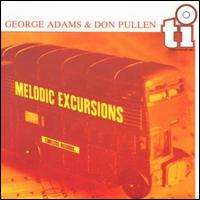Melodic Excursions
Melodic Excursions is an album by American jazz saxophonist George Adams and pianist Don Pullen Quartet recorded in 1982 for the Dutch Timeless label.[1]
| Melodic Excursions | ||||
|---|---|---|---|---|
 | ||||
| Studio album by | ||||
| Released | 1982 | |||
| Recorded | June 6 & 9, 1982 | |||
| Genre | Jazz | |||
| Length | 35:37 | |||
| Label | Timeless | |||
| Don Pullen chronology | ||||
| ||||
| George Adams chronology | ||||
| ||||
Reception
The Allmusic review by Steve Loewy awarded the album 3½ stars stating "Both Pullen and Adams fans should be satisfied with this effort, as each performer shines. While the recording may sometimes lack the seriousness that some might prefer from these giants of the genre, it's clearly one of their best group efforts".[2]
| Review scores | |
|---|---|
| Source | Rating |
| Allmusic | |
| The Rolling Stone Jazz Record Guide | |
Track listing
All compositions by Don Pullen except as indicated
- "The Calling" – 6:36
- "God Has Smiled on Me" (Traditional) – 3:23
- "Kahji" – 6:00
- "Playground Uptown and Downtown" (George Adams) – 4:50
- "Decisions" – 6:50
- "Reflexions Inward" (George Adams) – 4:24
- "Resolutions of Conflicts" (George Adams) – 6:32
- Recorded at Soundtek Studios in New York City on June 6 & 9, 1982
Personnel
gollark: Testbot, take phase AX apion interactions mediated by cryoapiomagnetic fields
gollark: Yes, I welcomed them.
gollark: Theoretically. PRs welcome!
gollark: ++magic reload_ext irc_link
gollark: ++magic reload_config
References
- Don Pullen discography accessed May 17, 2011
- Loewy, S. Allmusic Review accessed May 17, 2011
- Swenson, J., ed. (1985). The Rolling Stone Jazz Record Guide. USA: Random House/Rolling Stone. p. 3. ISBN 0-394-72643-X.
This article is issued from Wikipedia. The text is licensed under Creative Commons - Attribution - Sharealike. Additional terms may apply for the media files.